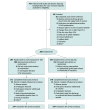Effect of Poloxamer 188 vs Placebo on Painful Vaso-Occlusive Episodes in Children and Adults With Sickle Cell Disease: A Randomized Clinical Trial
- PMID: 33877274
- PMCID: PMC8058640
- DOI: 10.1001/jama.2021.3414
Effect of Poloxamer 188 vs Placebo on Painful Vaso-Occlusive Episodes in Children and Adults With Sickle Cell Disease: A Randomized Clinical Trial
Abstract
Importance: Although effective agents are available to prevent painful vaso-occlusive episodes of sickle cell disease (SCD), there are no disease-modifying therapies for ongoing painful vaso-occlusive episodes; treatment remains supportive. A previous phase 3 trial of poloxamer 188 reported shortened duration of painful vaso-occlusive episodes in SCD, particularly in children and participants treated with hydroxyurea.
Objective: To reassess the efficacy of poloxamer 188 for vaso-occlusive episodes.
Design, setting, and participants: Phase 3, randomized, double-blind, placebo-controlled, multicenter, international trial conducted from May 2013 to February 2016 that included 66 hospitals in 12 countries and 60 cities; 388 individuals with SCD (hemoglobin SS, SC, S-β0 thalassemia, or S-β+ thalassemia disease) aged 4 to 65 years with acute moderate to severe pain typical of painful vaso-occlusive episodes requiring hospitalization were included.
Interventions: A 1-hour 100-mg/kg loading dose of poloxamer 188 intravenously followed by a 12-hour to 48-hour 30-mg/kg/h continuous infusion (n = 194) or placebo (n = 194).
Main outcomes and measures: Time in hours from randomization to the last dose of parenteral opioids among all participants and among those younger than 16 years as a separate subgroup.
Results: Of 437 participants assessed for eligibility, 388 were randomized (mean age, 15.2 years; 176 [45.4%] female), the primary outcome was available for 384 (99.0%), 15-day follow-up contacts were available for 357 (92.0%), and 30-day follow-up contacts were available for 368 (94.8%). There was no significant difference between the groups for the mean time to last dose of parenteral opioids (81.8 h for the poloxamer 188 group vs 77.8 h for the placebo group; difference, 4.0 h [95% CI, -7.8 to 15.7]; geometric mean ratio, 1.2 [95% CI, 1.0-1.5]; P = .09). Based on a significant interaction of age and treatment (P = .01), there was a treatment difference in time from randomization to last administration of parenteral opioids for participants younger than 16 years (88.7 h in the poloxamer 188 group vs 71.9 h in the placebo group; difference, 16.8 h [95% CI, 1.7-32.0]; geometric mean ratio, 1.4 [95% CI, 1.1-1.8]; P = .008). Adverse events that were more common in the poloxamer 188 group than the placebo group included hyperbilirubinemia (12.7% vs 5.2%); those more common in the placebo group included hypoxia (12.0% vs 5.3%).
Conclusions and relevance: Among children and adults with SCD, poloxamer 188 did not significantly shorten time to last dose of parenteral opioids during vaso-occlusive episodes. These findings do not support the use of poloxamer 188 for vaso-occlusive episodes.
Trial registration: ClinicalTrials.gov Identifier: NCT01737814.
Conflict of interest statement
Figures


Comment in
-
Poloxamer 188 for Sickle Cell Disease.JAMA. 2021 Apr 20;325(15):1524. doi: 10.1001/jama.2021.3399. JAMA. 2021. PMID: 33877286 No abstract available.
-
Poloxamer 188 vs Placebo for Painful Vaso-occlusive Episodes in Children and Adults With Sickle Cell Disease.JAMA. 2021 Sep 14;326(10):975. doi: 10.1001/jama.2021.11100. JAMA. 2021. PMID: 34519808 No abstract available.
-
Poloxamer 188 vs Placebo for Painful Vaso-occlusive Episodes in Children and Adults With Sickle Cell Disease.JAMA. 2021 Sep 14;326(10):974-975. doi: 10.1001/jama.2021.11097. JAMA. 2021. PMID: 34519809 No abstract available.
References
Publication types
MeSH terms
Substances
Associated data
LinkOut - more resources
Full Text Sources
Other Literature Sources
Medical

